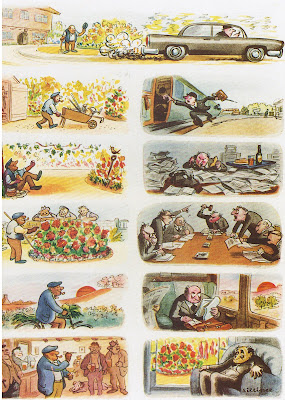In SafeHaven on 9 July 2007,
Robert McHugh predicted the Dow would drop to 9,000
"over the intermediate-term, although if the PPT responds by hyperinflating the money supply, it could be 9,000 in real dollars (gold adjusted), not nominal." This would mean a drop of 33.88% from its 6 July value. Others have also forecast a fall in the Dow and/or the dollar. I plan to test this assertion from time to time.The situation is complicated by monetary inflation in the USA, and in other countries that are trying to maintain the exchange rate of their currencies against the dollar, in order to protect their trade with America. So we'll take the Dow as it was on 6 July (the chart McHugh was using) and adjust for relative currency movements and the price of gold.
Starting points for
6 July 2007: the Dow was
13,611.69; gold (London AM fix) $647.75/oz.; using the interbank rates as given by O&A, one US dollar bought 122.7160 Japanese yen, 0.49630 British pounds, 0.73450 Euros, 7.60760 Chinese yuan/renminbi.
Situation as at c. 7 a.m. GMT
31 August 2007: Dow 13,238.73; gold $666.30; dollar buys 115.73200 Japanese yen, 0.49660 British pounds, 0.73280 Euros, 7.55580 Chinese yuan/renminbi. Adjusting for movements in currencies and the price of gold,
we reinterpret the Dow today as being worth:12,870.16 against gold
12,485.29 against the Japanese yen
13,246.73 against the British pound
13,208.09 against the Euro
13,148.59 against the Chinese yuan/renminbi
At present and in purchasing terms, the Dow since 6 July 2007 has fallen most (8.275%) against Japan, next against gold (5.45%), then China (3.40%), Europe (2.97%) and the UK (2.68%). I see this last as a measure of Britain's own weakness.
So within two months, and against the yen, the Dow has already fallen by about one-quarter of McHugh's predicted overall drop.
September 8: since August 31, the Dow has slipped further to close at 13,113.38 on Friday; gold has risen to $701 (London PM gold fix). Adjusted for the rise in the price of gold, the Dow is now the equivalent of 12,117.25. So in terms of Robert McHugh's prediction, it has lost 10.98% since July 6. Time for another quiet release of gold by central banks?
September 18: At the time of writing (6 p.m. British Summer Time), the Dow stands at 13,493 and gold at $713.70/oz. Adjusted for the change in the price of gold, the Dow has fallen by just over 10% since July 6.
September 21: Dow currently 13,839.54, gold (10.03 a.m. NY time) $736.30. Adjusted for the change in the gold price, the Dow would be worth 12,175.15, or down 10.55% since July 6.
Putting it another way, gold has risen 13.67% against the dollar in 77 days; that's getting on for 90% annualised. Is this lift-off for Doug Casey's trip to the moon?
September 29: July 6 to present: Dow up from 13,611.69 to 13,895.63; gold up from $647.75/oz. to $743.10. So the "gold-priced Dow" is down 11.01% in 84 days.
Annualised equivalent: gold increasing by c. 82% p.a., "gold-priced Dow" falling 40% over a year. Will these trends continue?
October 27: The Dow is currently at 13,806.70, up slightly from its July 6 valuation of 13,611.69. But gold has risen from $647.75 to $783.50 in the same period - up 21% in 113 days, or around 85% annualised. This means the "gold-priced Dow" is worth 11,414.54. At this rate,
Robert McHugh's prediction will be fulfilled by March 8 next year.
November 2: Dow at 13,595.10, gold $806 per ounce. Since July 6, Dow has appeared to hold its ground, but the "gold-priced Dow" has dropped to 10,925.83 - a fall of over 49% annualised. And at this rate, gold will have doubled in dollar terms by July 2008.
November 7: Dow at 13,660.94, gold $833.80/oz. "Gold-priced Dow" has therefore gone down since July 6, from 13,611.69 to (effectively) 10,612.71, a drop of 22% (or 52% p.a. annualised).
To put it another way, the Dow has stood still and gold has risen 29% (or 112% p.a. annualised) over the last 123 days.
January 13, 2008: Last year, Robert McHugh predicted that the Dow would drop to 9,000, if not in nominal terms then in relation to gold. The Dow was then 13,238.73 and gold $666.30/oz, which means that it took 19.87 ounces of gold to buy the Dow. McHugh's prediction implies the Dow dropping to 13.51 gold ounces (a fall of 6.36 ounces).
The Dow is now 12,606.30 and gold $894.90, so the Dow is now worth 14.09 gold ounces. It has fallen by 5.78 ounces out of the predicted 6.36, so the prediction is 90.9% fulfilled so far.
McHugh will be fully correct if, for example, the Dow remains unchanged and gold rises to $933/oz; or if gold stalls, the Dow will need to fall to 12,090.
January 18, 2008: Dow 12,082.31, gold $880.50/oz, so the Dow is now worth 13.72 ounces of gold as against Robert McHugh's prediction of 13.51.
Nearly there, and the new announcement of a $145 billion reflation may push gold that extra yard.
January 22, 2008: As at the time of writing, the Dow is 11,820.24 and gold $875.90/oz. The Dow/gold ratio is therefore below 13.51 and has (perhaps fleetingly) fulfilled Robert McHugh's prediction.
Whether the Dow falls below 9,000 nominal in the course of a severe recession is something we shall have to see.
















